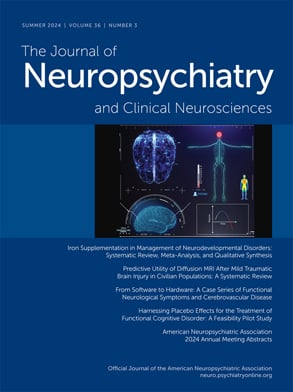SIR: Conditions of chronic poisoning by inorganic mercury (hydrargyrism) have been described in persons who habitually handle this material. Besides the physical symptoms, the patients present important neuropsychiatric features because the central nervous system (CNS) is the main target of mercury.
1–5 Cognitive evaluations of individuals with hydrargyrism show disturbances that persist over the years, even after interruption of exposure to mercury.
1–4 Insomnia is a symptom that also persists as a sequelae.
5 Here, the case of a patient with depression, insomnia, and recent memory loss related to the chronic intoxication by inorganic mercury is discussed.
Case Report
About 5 years ago, a 45-year-old patient without personal or familial history of psychiatric disorders started to work in a lamp factory, where he handled inorganic mercury. Some 6 months after daily contact with the metal, he started to present with gingival hemorrhage, headache, tremors of the extremities, loss of the recent memory, insomnia, and severe depression (lack of pleasure, social withdrawal, psychomotor retardation, depressive mood, feelings of worthlessness and inappropriate guilt, irritability). Even exhibiting such a condition, the patient continued to perform the same function for 1 more year. In this way, his symptoms became more intense. After a high metal dosing in his urine (only at that moment he was submitted to this exam), 105 mg/L (nl: 25mg /L), the patient was dismissed from work. Subsequent to withdrawal from exposure, the physical symptoms disappeared; however, the neuropsychiatric symptoms continued. For 3 years, the patient remained without medical care, and he was then referred to our outpatient unit. At that time, the patient did not show detectable levels of mercury in his urine. As the patient exhibited significant depressive symptoms, he was administered sertraline. While his changes of mood improved, the dose of antidepressant was increased until it reached 250 mg/day. With this dose, the patient no longer presented with depression; however, recent memory impairment and the insomnia persisted.
Comment
Diagnosis of hydrargyrism for this patient seems unquestionable, taking into account the characteristics of the symptoms (physical and neuropsychiatric) and mercury dosing in his urine. Further evidences are the onset of the symptoms after the exposure to inorganic mercury, worsening related to the time of exposure, and improvement of the physical symptoms soon after interruption of the exposure. Nevertheless, the neuropsychiatric symptoms continued, even after exposure ended and mercury levels in the urine became normal. This phenomenon suggests that neuropsychiatric symptoms associated with poisoning by mercury are not restricted to the acute stage of intoxication but persist as sequelae1-5.
With antidepressant drug treatment, the patient presented remission of the depression symptoms. Notwithstanding remission of the depressive condition, insomnia and loss of memory did not improve with the use of the antidepressant. The continuation of these symptoms in this situation minimizes the possibility that they may be the outcome of the depression disorder, thus memory loss and insomnia seem to be related to the chronic poisoning by mercury in this case.

